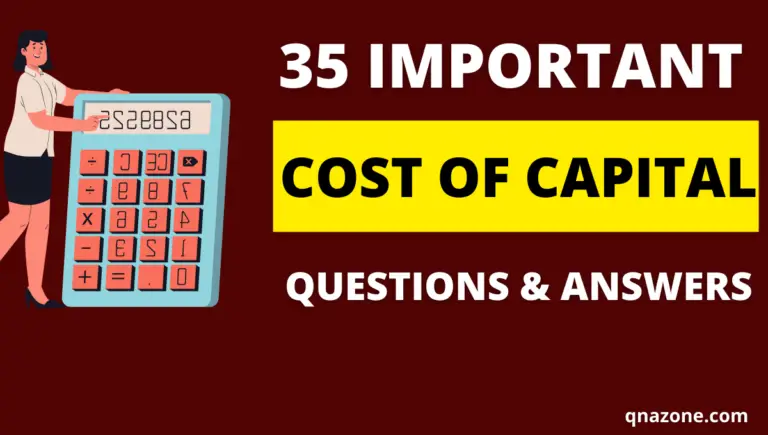35 Important Long-Term Financing Questions and Answers [With PDF]
The 4th chapter of our Finance learning course is “Long Term Financing”. In this article, we’ll learn the 35 most important long-term financing questions and their answers.
It will help you understand the important long-term financing terms and their explanations quickly.
You can read the previous three chapters of our Finance learning course here if you missed them.
- 25 Important Introduction to Finance Questions and Answers [With PDF]
- 30 Important Time Value of Money Questions and Answers [With PDF]
- 35 Important Short Term and Mid Term Questions and Answers [With PDF]
By reading this post, you may quickly prepare for Finance courses and for any competitive tests such as school and college exams, vivas, job interviews, and so on.
So let get started…
Long-Term Financing Questions and Answers
The 35 important long-term financing questions and answers are as follows:
Question 01: What is Long-Term Financing?
Answer: The money that is usually collected and used for a period of five years or more is called long-term financing. In other words, the money that a business collects to meet its long-term needs is called long-term financing.
Question 02: What it the Characteristics of Long-Term Financing?
Answer: The main characteristics of long-term financing are as follows:
- Its duration is more than five or seven years.
- This type of financing is collateral.
- Large businesses use this type of financing.
- There are many financial instruments for long-term financing.
- There are many formalities involved in raising long-term funding.
- The size of long-term funds is usually larger than the size of short-term and medium-term financing
Question 03: What are the Sources of Long Term Financing?
Answer: The sources of long term financing are as follows:
Internal Sources:
- Owners’ Equity
- Retained Earnings
- Depreciation fund
External Sources:
- Commercial Banks
- Leasing Companies
- Insurance Companies
- Investments Bank
- Share
- Bond or Debentures
- Warrants
Question 04: What is Bond?
Answer: A bond is a long-term loan agreement under which the borrower commits to pay interest and principal on time.
Question 05: Who are the Bond Issuing Authorities?
Answer: The bond issuing authorities are as follows:
- Government
- Corporation
- Municipal Authority
- Foreign Government or Company
Question 06: What are the Characteristics of Bond?
Answer: The characteristics of bond are as follows:
- It is a debt instrument
- Its repayment time is fixed.
- Bonds have a fixed written value.
- Bonds are usually secured, but can also be unsecured bonds.
- It is transferable.
Question 07: What is the Classification of Bond?
Answer: The classification of bond is as follows:
Based on Issuer Institution:
- Treasury Bond
- Corporate Bond
- Municipal Bond
- Foreign Bond
Based on Security:
- Secured Bond
- Unsecured Bond
Based on Security Nature:
- Mortgage Bond
- Equipment Trust Certificate
- Chattel Mortgage
Others Bond:
- Income Bond
- Convertible Bond
- Callable Bond
- Put Bond
- Junk Bond
- Coupon Bond
- Zero-Coupon Bond
Question 08: What is Treasury Bond?
Answer: Treasury bonds are long-term bonds issued by the government. Treasury bonds are risk-free securities.
Question 09: What are the Advantages of Financing through Debenture?
Answer: The main advantages of financing through debenture are as follows:
- Less cost
- Tax advantages
- Fixed interest rate
- Fewer formalities
- Proper control
Question 10: What are the Disadvantages of Financing through Debenture?
Answer: The main disadvantages of financing through debenture are as follows:
- Collateral Problem
- Less earning per share
- Increase risks
- The limited scope of works
- Wastage of money
Question 11: What are the Three Methods of Determining Yield from Bond?
Answer: The three methods are as follows:
- Yield from maturity
- Yield to call
- Current yield
Question 12: What is a Call Bond?
Answer: A call bond is a bond that is usually repurchased by the issuer after a certain period of time but before the maturity of the bond.
Question 13: What is Put Bond?
Answer: In the case of such bonds, the bondholder himself requests the issuer of the bond to purchase the bonds after a certain period of time.
Question 14: What is a Junk Bond?
Answer: Generally, a bond that has a high risk and a relatively high return is called a junk bond
Question 15: What is Coupon Bond?
Answer: A coupon bond is a bond that has a fixed interest rate, maturity date, written value, and so on. Anyone who retains such a bond at the time of interest payment is usually entitled to interest.
Question 16: What is the Formula of Determining Zero-Coupon Bond?
Answer: The formula for determining zero-coupon bond is as follows:
Vb = MV /(1+Kd)^n
Here,
Vb=Value of Zero Coupon Bond
MV= Maturity Value
N= Number of Years
Kd= Cost of debt
Question 17: What is Perpetual Bond?
Answer: A bond that usually does not have a repayment period is called an infinite bond. In the UK, such bonds are also called consoles.
Question 18: What is an Equity Bond?
Answer: If the current market value of a bond is equal to its written value or face value, it is called an equity bond.
Question 19: What is Premium Bond?
Answer: If the current market value of a bond exceeds the written or face value, it is called a premium bond.
Question 20: What is Discount Bond?
Answer: If the current market value of a bond is less than the written or face value, it is called a discount bond.
Question 21: What is Bond Market?
Answer: The bond market is the place and function of the transfer of ownership of any type of bond.
Question 22: What is Yield to Call (YTC)?
Answer: If a bond is called before maturity by the issuing institution, the rate of return on earnings up to the call is referred to as the Yield to Call (YTC).
Question 23: What is the Current yield?
Answer: Current yield refers to the percentage of the current market value of the bond’s coupon interest amount
Question 24: What is Yield to Maturity?
Answer: When an investor purchases a bond at the current market price and holds it until maturity, the rate of return on earnings is referred to as yield to maturity.
Question 25: What is Stock?
Answer: Shares are the smallest part of the capital of a joint-stock company. An important source of capital for a public limited company is the sale of shares.
Question 26: What is the Process of Issuing Stock?
Answer: The process of issuing stocks are as follows:
- Decision and approval
- Registration
- Analysis of registration paper
- Approval from SEC
- Preparation of issuing stock
- Process of issuing stock
Question 27: What are the Types of Stock?
Answer: The types of stocks are as follows:
- Common stock
- Preferred stock
Question 28: What is Common Stock?
Answer: Common stock is the residual ownership that entitles stockholders to claim or the times earning assets after all prior claims have been satisfied.
Question 29: What are the Characteristics of Common Stock?
Answer: The characteristics of common stock are as follows:
- Ordinary shares, part of the ownership capital
- Ordinary shareholders own the company.
- Only the shareholders’ rights arise on what they have after paying various liabilities.
- Ordinary shareholders control the company.
- Every ordinary shareholder has the power to cast a certain number of votes
Question 30: What is the Formula for Determining the Value of Common Stock?
Answer: The formula for determining the value of a common stock is as follows:
Zero Growth Model:
Po = D1/Ke
Here,
P0= Current price of a share
D1= Probable Dividend= Do(1+g)
Ke= Capital cost of the ordinary share
Constant Growth Model:
Po=D1/(Ke-g)
Variable Growth Model:
Po = D1/(1+ke)^1+D2/(1+Ke)^2+………….+(Dn+Pn)/(1+Ke)^n
Question 31: What is Preferred Stock?
Answer: Preference stocks are the stocks held by the joint venture company’s owners who have first priority in recovering capital when dividends are received and liquidated.
Question 32: What are the Types of Preferred Stock?
Answer: The types of preferred stock are as follows:
- Cumulative preferred stock
- Non-Cumulative preferred stock
- Redeemable preferred stock
- Irredeemable preferred stock
- Participating preferred stock
- Non-participating preferred stock
- Convertible preferred stock
Question 33: What is the Difference between Share and Debenture?
Answer: The important difference between share and debenture is as follows:
- A small equivalent of a company’s capital is called a share, while a bond is a deed of debt.
- The shareholders are the owners of the company, while the debtors are the creditors of the company.
- Shareholders have the right to vote, while bondholders have no right to vote.
Question 34: What is Valuation?
Answer: Valuation is the process of determining the present value of the amount of money that will flow from a property in the future.
Question 35: What are the Determinants of Investment Decision?
Answer: The important determinants of investment decisions are as follows:
- Earnings per share
- Income of the previous year
- Types of business
- Management of company
- Number of shares
- Amount of capital
I hope that by the end of this post, you have a good understanding of the “Long-Term Financing” chapter.
You will gain a better understanding of the “Long-Term Financing” chapter if you read these 35 important Long-Term Financing questions and answers on a regular basis.
You can also read:





